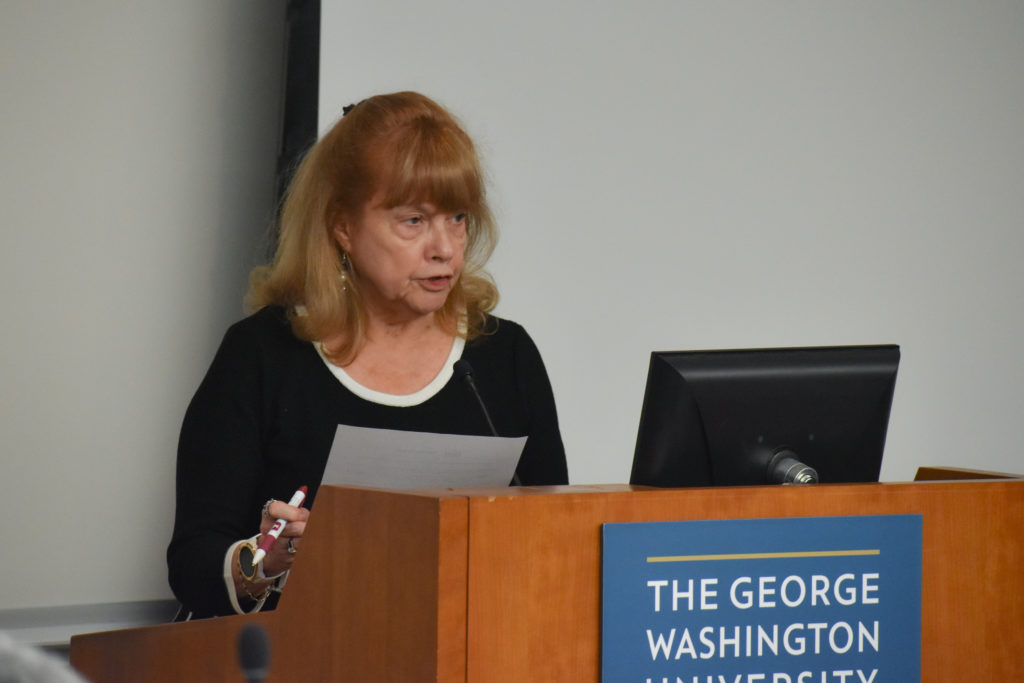Updated: Dec. 21, 2019 at 8:58 p.m.
The Faculty Senate voted on several resolutions Friday aimed at increasing faculty involvement in the University’s strategic planning process.
Senators passed resolutions to hold a special meeting of the Faculty Assembly next semester, to establish a special committee to prepare a report on the strategic planning process for the association and request updates on behalf of four senate committees from the four strategic planning committees. The bills followed an assembly petition the group approved at its October meeting to demand more information from administrators about the strategic planning process.
Sylvia Marotta-Walters, the chair of the senate’s executive committee, introduced the three resolutions presented at the executive committee’s direction before the full senate. Senators originally passed the first resolution as drafted – which would have convened a meeting of the Faculty Assembly in January to consider updates on the strategic plan – but later amended the resolution to move the date to February, in light of the decision to delay the final vote on the strategic plan from May to June.
“I will do what the senate asks me,” Marotta-Walters said. “That’s my role.”
Senators also approved an amended version of the second resolution, to form a committee responsible for creating a report addressing each point of the petition Faculty Assembly members approved in October. Sarah Wagner, an associate professor of anthropology who serves as a member of the Faculty Senate and Faculty Assembly, introduced an amendment to give the committee until Feb. 3 to produce the report.
The committee originally would have been required to complete the report by Jan. 2 for the report to be placed on the senate’s agenda for its January meeting and on the assembly’s agenda for its proposed meeting in the spring, according to the resolution, but several senators serving on strategic planning and senate committees raised objections about the rapid timeline for compiling the reports.
“The spirit of the petition is deliberation, not just to drink from the fire hose,” Wagner said.
After senators passed the resolution, Wagner and four other senators – professor of economics Joseph Cordes, associate professor of history Daniel Schwartz, professor of engineering Kausik Sarkar, professor of biology Guillermo Orti and associate professor of engineering Jason Zara – nominated themselves to serve on the committee, with Wagner selected to serve as the chair.
The senate unanimously approved a third resolution asking the four strategic planning committees to provide their reports to relevant senate committees and asking the Strategic Planning Task Force to submit its report to the same committees.
Leaders from each of the strategic planning committees gave reports to the senate during the meeting, which Zara – the senate’s educational policy and technology committee chair who serves as vice chair of the undergraduate education strategic committee – said he expects to continue in the future.
“I know all of the task force committees are very happy to report to whoever wants to hear from them,” he said.
The resolution also called on University President Thomas LeBlanc and administrators to answer a series of eight questions about the planning process, if they had not been previously answered, and affirmed the educational policy and technology committee’s position that the strategic plan should not result in losses in diversity, financial aid, the student experience or academic quality.
Senators postponed discussion about a resolution to emphasize the University’s commitment to shared governance, which the body will revisit at its January meeting next year.
At the meeting, LeBlanc gave a presentation about the data that trustees and other officials used to decide to cut the undergraduate enrollment by 20 percent and increase the ratio of STEM majors to 30 percent over the next five years.
“This is the first real grip the Senate has gotten on the exact numbers and this is exactly what we were looking for,” said Philip Wirtz, a faculty senator and professor of decision sciences. “So we’re all I think very appreciative of those numbers.”
The agenda also included an update from Vice President of Research Bob Miller on the progress his office has made to implement suggested recommendations growing out of GW’s research ecosystem report.
Lynn Goldman, the dean of the Milken Institute School of Public Health, presented the first update on the school to the senate in at least five years. She said the school has expanded to seven academic departments with the creation of the health policy and management department and the addition of the biostatistics and bioinformatics department in July.
Goldman said the school’s rankings have increased “considerably” in the past few years, falling at 12th on a list of 200 public health schools nationally. She said officials have introduced several new degrees and programs in that time, like a bachelor of science in nutrition science.
She added that the school’s research endeavors have grown larger and gained more attention in the public sphere in recent years, highlighting a study examining the death toll caused by Hurricane Maria in Puerto Rico that received intense media coverage.
“There are many other things that are important milestones that have happened, with our laboratories being built,” Goldman said.
This post has been updated to reflect the following corrections:
An earlier version of this post misidentified the Faculty Assembly as the Faculty Association. That error has been corrected. This post has also been updated to clarify the membership of the special committee created by the third resolution and to properly qualify the education policy and technology committee’s stance on enrollment changes. We regret these errors.







